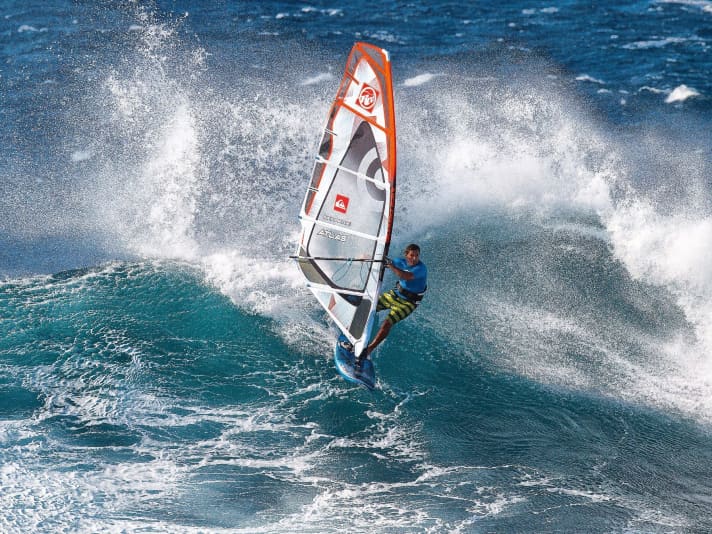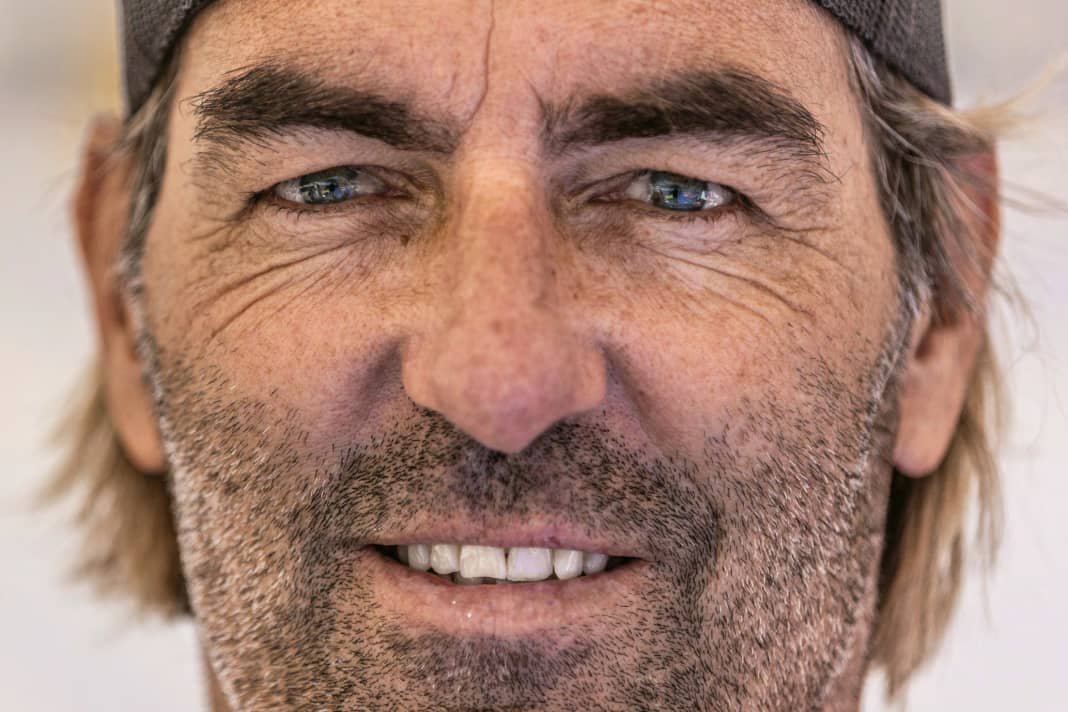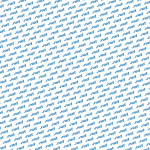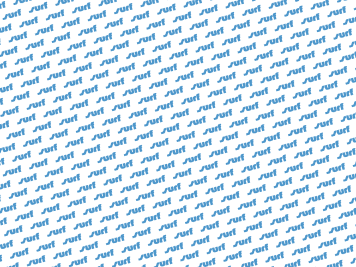Immediately before the last World Cup in Japan in 2022, the 25-time world champion Antoine Albeau announced that he was retiring from PWA competition. After 30 years on the tour, filled with countless wins and memories, Albeau decided it was time to hang up his PWA gear and start a new chapter in his windsurfing life. John Carter caught up with Antoine to talk about his extraordinary career.
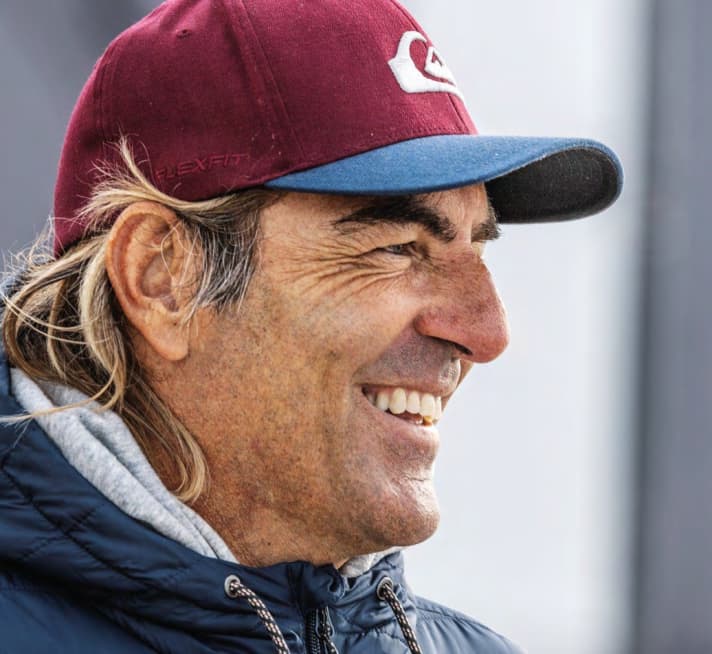
The early days: Antoine Albeau started surfing in 1979
I started windsurfing at a young age because my father had a windsurfing school on the Île de Ré on the west coast of France. He opened the school in 1972, when windsurfing was just taking off. I was born on 17 June 1972 and started windsurfing at the age of five. When I learnt to windsurf, the equipment wasn't that suitable for children - it was heavy and more for adults to learn on. I think when I was ten or eleven years old, I took part in my first competitions at my home spot. We had events every weekend in the summer. I was national champion in the under-fourteen category, I think that was in 1986. After that, I went to a sports school in La Rochelle that taught sailing and water sports. At the time, I was training in the Olympic discipline (Lecherner 390 displacement). I also surfed on funboards on the side. When I was 19, I became a professional windsurfer. A year earlier, I surfed 315 days a week, so I kept notes on every session that lasted longer than thirty minutes.
My first PWA event was in 1992 in Almanarre, France. After that I was in Aruba, Holland and Sylt. In Aruba I won a round of slalom ahead of Bjorn! I think you can find this race on YouTube. I won my first world title in 1994 at the IFCA event in Denmark. I won the slalom, the course race and the overall title that year, so that was three world titles. I won my first world title in the PWA in 2001 in freestyle. I was good at playing around with the sail and was lighter than I am today. I had an epic final in Gran Canaria against Matt Pritchard to win the title. There was no slalom on the PWA tour between 2001 and 2005.
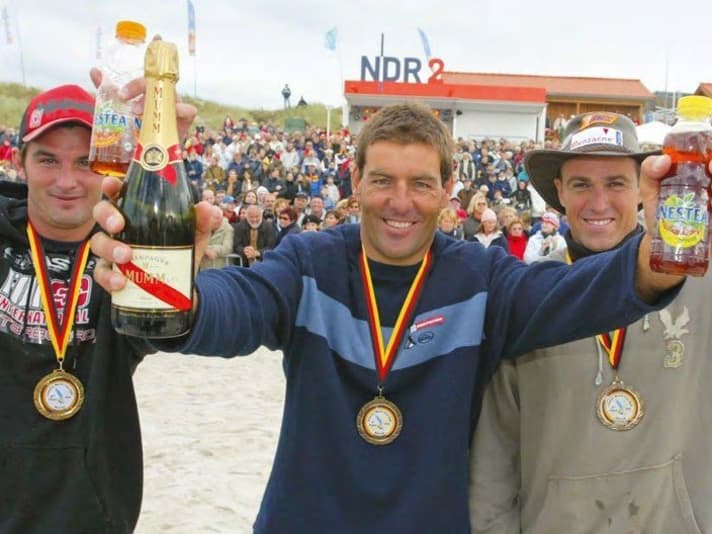
When the slalom came back, I won the title almost continuously from 2006 to 2015 - with the exception of 2011, when Björn won. Matteo Iachino took the title in 2016, but I won again in 2017 and 2018, and in 2019 it was Pierre Mortefon. I was also pretty good in the nineties. In 1996 and 1997, I was in the top five at almost every event.
Money makes the world go round: Antoine Albeau on his sponsors
Back then, everything was open and there was a lot of money at stake. There was a lot of money in the industry and the guys at the top could afford the best equipment and carry around more boards and sails than the new guys on the tour. Unless you had the necessary support, it was hard to compete. Björn had all the customised gear and was also a fantastic surfer, so he dominated at the time. I couldn't compete because I was just starting out and didn't have the budget. When I got a contract with NeilPryde in 1997, I was given special equipment. That's when I started having boards and sails customised. I've been riding for NeilPryde for 26 years now!
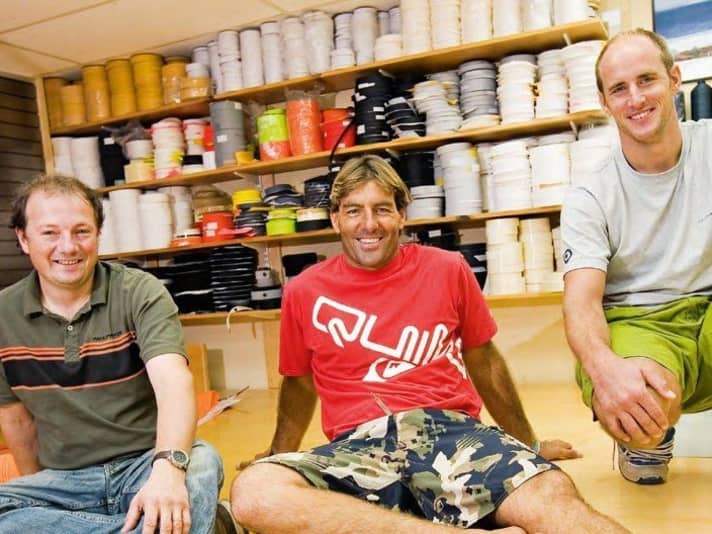
Back then, I was on the water every day when it was windy. At that time, I spent many weeks on Maui and in New Caledonia. I surfed 320 days a year, maybe even more. It's almost always windy on Maui, so I trained and surfed every single day I was there.
Dunkerbeck, Naish and other rivals
When I started competing, there were a lot of very good French surfers alongside Dunkerbeck and Naish. There was Robert Teriitehau, Fabien Pendle, Eric Thieme and Patrice Belbeoch, who were all ahead of me at the beginning. I was still lagging behind a bit. I made it into the top ten, but they were all ahead of me. After many years, I was about to become the best French sailor. That was when I started competing with Björn and Robby.
To get to the top of the rankings, it was all about experience and the number of hours you surfed. You also had to be able to deal with the stress and the mental side. When you're first on the slalom course and Dunkerbeck is hot on your heels, it wasn't easy mentally. You couldn't afford to make any mistakes in order to finish first. There was also a lot of stress before the start and on the water. We've seen a lot of riders over the years who were really good but couldn't handle it. From 2006, I was at the front and won every year until 2018 - except 2011 and 2016. In 2011, when Björn came back, I had a problem because he was a bit faster. I think maybe my equipment wasn't the best that year. Björn was very well set up and just flew. I fought with him, but he won. Ben van der Steen also fought for the title that year and came third, but he was a bit behind our level.
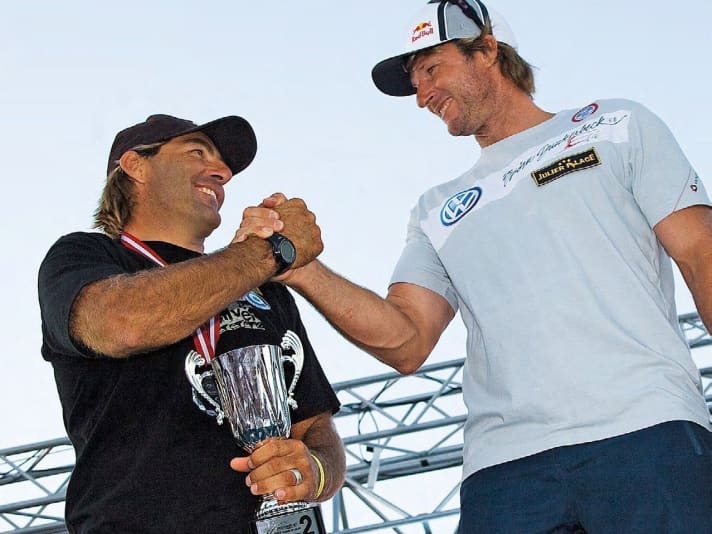
After 2011, Björn was still there, but I dominated the next era. There was Micah Buzianis, Finian Maynard and Arnon Dagan. I think I was the best at that time. In the group behind them, there wasn't one standout guy battling with me. There were a lot of guys fighting for second place, but there wasn't anyone who stood out. Maybe I was lucky at the time. I was the best - and there was nobody fighting with me for first place. Nevertheless, it wasn't easy to stay at the top. There were a lot of battles. I had to stay focussed the whole time. There was always tough competition, even though I still won.
Matteo Iachino and Pierre Mortefon were the next generation that challenged me from around 2016. The generation of Arnon and Finian was also still there. I remember when Matteo started competing. He was there, but I didn't feel like he was ever going to be a big threat. Then one year he just rose to the top and we were fighting for the title together all the time.
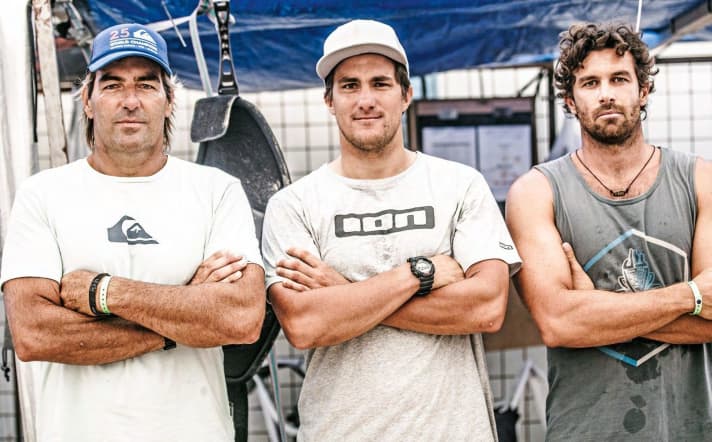
Respect for each other is very important
I had a few problems with Pierre Mortefon because he didn't really like the guys he was fighting with due to his temperament. I had the feeling that he had no respect for me compared to Matteo. I could sense that Matteo had a lot of respect for what I had achieved. I think when you're at the top, it's very important to respect the other guys. I had already won a lot and had a long career behind me when they started to fight with me. I've always respected Björn, for example. He was the leader for so many years - you can't brush aside what he's achieved. I don't think Pierre respected me like that. We argued a few times on the water and on the beach. That never happened with Matteo. We had this epic slalom in Fuerteventura where we were fighting to win the event. It was a tough but fair race. I could have crashed, but in the end he crashed. He accepted that, it was a fair race - and I think he has a lot of respect for me.
Strong winds: "I like 40 knots of wind"
I think I've always been strong in strong winds, but I've managed to adapt and be competitive even in light winds. There was one year when we only had four events and they were all pretty light winds. I surfed with 9.5 square metres all the time, but I still won. I was able to adapt to the conditions we had to surf in. I was actually always competitive, although I did best in strong winds.
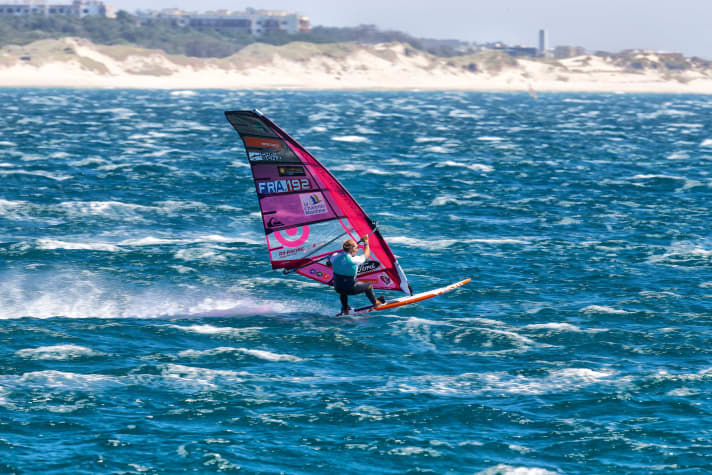
Purely a matter of the head?
I have never worked with a mental or psychological coach. I know that a lot of modern athletes work on their mental skills these days. I've never done that. I think my brain is just made for that kind of pressure. I was lucky that I was able to concentrate and stay mentally calm. I certainly had stress too. But a big part of the game is dealing with it and keeping a clear head so you can make the right decisions on the course. I've always been able to handle my stress well.
I used to have a quick temper
When I was young, I got angry a few times and threw my equipment away. I learnt that it only gets worse when you start breaking your equipment. You're then in an even worse position because you have to get it repaired. I stopped doing that and preferred to be annoyed with myself. In Israel in 2020, however, I snapped. I was really angry because I'd had a stressful time while I was building my house. It took up so much of my time that I hardly got out on the water for three winters. I didn't have that much time to train.
Before the event, I don't think I had been in the water for three or four months. I arrived in Israel right after I started my centre. I was physically tired. But when the competition started, I realised that I was competitive and could fight for the podium. In one of the finals, they didn't wait for me to start, even though I wanted to change my equipment. I was very angry. They said I had been dawdling around on the beach. I wanted to change my slalom equipment and couldn't get off the beach because there was a wind cover. But they didn't wait for me. I was stuck on the beach and, in my opinion, I was right to be angry. I knew I was in contention for the top spot - and that just really knocked me for six. I lost everything because of that decision.
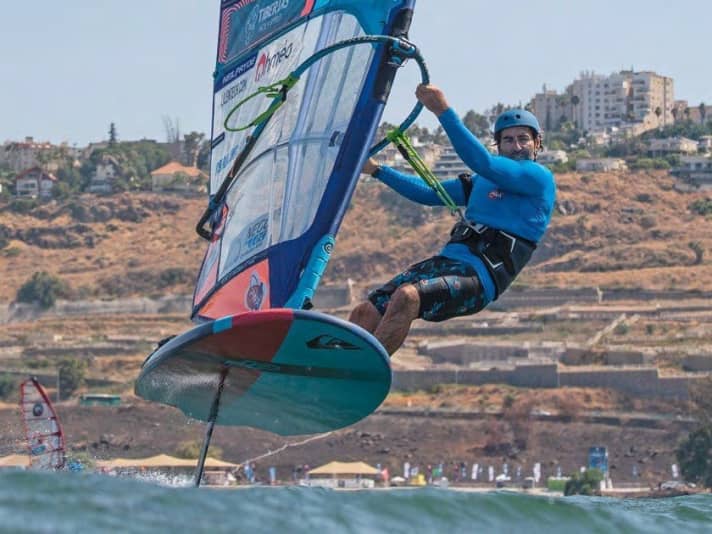
Antoine Albeau and the PWA resignation
I didn't stop because of the switch from PWA to foil racing. I like foiling and I think I'm also fast on the foil. I wanted to stop racing for the last two years. Covid had messed up my plans and made it difficult for racers and sponsors. At the end of 2020, I had no sponsors. NeilPryde and JP didn't sign me anymore. I was ready to sign - but when Covid came, a lot of budgets were changed. In March it was time to sign, everything was up in the air. The PWA tour and all events were put on hold. In July, I got an offer for free equipment. I didn't want to sign a contract just for the equipment. During this time, I did what I could in terms of advertising. In 2021, I realised that there wouldn't be as many events again. So I decided to keep going for the time being. By the time 2022 came around, I had decided that I would no longer ride on the PWA tour after the end of the season. The time was right. I'm not going to stop windsurfing, I only stop racing on the PWA tour .
I want to work a lot on my Zephir Speed project and ride in all the Defi Wind events. I think there will be four or five events next year. I think that's good publicity for windsurfing - and we get to go to new places. I also want to take part in the speed championship. Of course, I want to spend more time with my family and also be able to look after my centre. It will be great to spend more time with my wife Paola and my two sons Alani and Adriel.
I don't know if I will miss the thrill of the PWA competitions. I think I will, but I've had so many great years and I think I've had my time. As an athlete, I know it won't be the same if I can't ride at the front anymore. It wouldn't be good to compete in that way. At the moment, I'm at the level where I couldn't finish in the top five. But that would always be my ambition when I go to the start. Normally I'm there to win! Next year I want to take more time for training. I want to get back out on the water more and better tune my equipment. I want to go really fast again and fight for victory in all these long-distance races. That would be super nice for me.
Secrets of success by Antoine Albeau
Ultimately, there is no secret to my success. You're either made for it - or you're not! I think I did the sport I was made for. And I was made for windsurfing. As soon as I started winning, it got harder and harder for me. In the off-season it was very difficult mentally because the pressure for the next season was so great. You're the guy everyone wants to beat. I remember being stressed in January of every new season and wondering if I was ready to win again. There was so much work with all the equipment and training to get ready for a season and make sure you were going to be the fastest guy on the water. It was really tough to be the one to beat. The pressure was enormous. It's like that in all sports. You have to be mentally strong. You also have to keep up the motivation to keep going, even if the path sometimes leads downwards.
I have also tried out all disciplines for a large part of my career. In 2001, I won in Formula Windsurfing and was world champion in Freestyle at the same time. If you ride several disciplines, it can distract you from your main focus. You might not win the discipline you want to win because you're wasting your time on other training. I did all the disciplines and was good in all of them.
The supreme discipline: speed
I wanted to go to Lüderitz for the Speed Canal this year, but the event in Japan took place at the same time. In Lüderitz you have to drive for a whole month. You can just do two weeks on the canal, but then you run the risk of missing that one epic day. But you can't miss the best day. This year, the strongest winds were at the end of the time window. You have to be there. I don't want to spend a lot of money for nothing.
I have the World speed record on 1 November 2015 with a speed of 53.27 knots. On that day, I did 15 runs at more than 52 knots and nine at more than 53 knots! Now I want to break the record with the Zephir project. We are looking for a big sponsor. I won't be sailing with a classic fin anymore - it will be something different: more like half and half! We have a few ideas, but we need an engineer to work on our concepts. We couldn't do the Zephir project in Lüderitz because it's too short and too flat. If I drive 120 km/h, I have a problem stopping at the end of the track. If I go any faster, it would be impossible to stop. We will try it on the open sea. We want to break the record over 500 metres and the nautical mile. You also have to have the heats validated, so it's difficult to organise. There are only two places where you can do this. Lüderitz and La Palme in the south of France. The current speed record over 500 metres is 65.45 knots in the hands of Paul Larson and Sailrocket 2. I would like to reach over 66 knots!
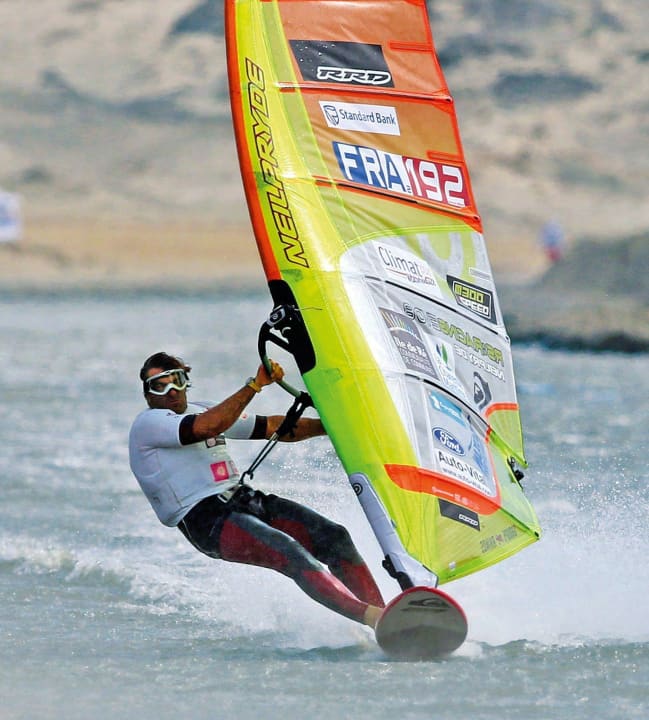
Antoine Albeau and his rivals
There are a lot of people I respect and have raced against over the years. I've had some great races and seasons against Björn. Patrice Belbeoch and Micah Buzianis were also great competitors, Finian Maynard and Arnon Dagan I also respect. I also fought a lot with them. Matteo and I have had a lot of great fights recently. It's been fun racing with all these guys over the years. There are a lot of great memories. There were also a lot of talented racers who came and went. People like the Swede Christoffer Rappe. He was a very talented racer - and was at the top around 2005. He was really good back then, but then he stopped to study. He was one of the best windsurfers in the world. Having a career in windsurfing is really tough. I was lucky, I had great sponsors and won a lot of races. That made it all possible for me. If you look at my sails, there's not a single sticker that I don't get paid for. My biggest sponsors are no longer NeilPryde and JP, I'm now supported by sponsors from my neighbourhood.
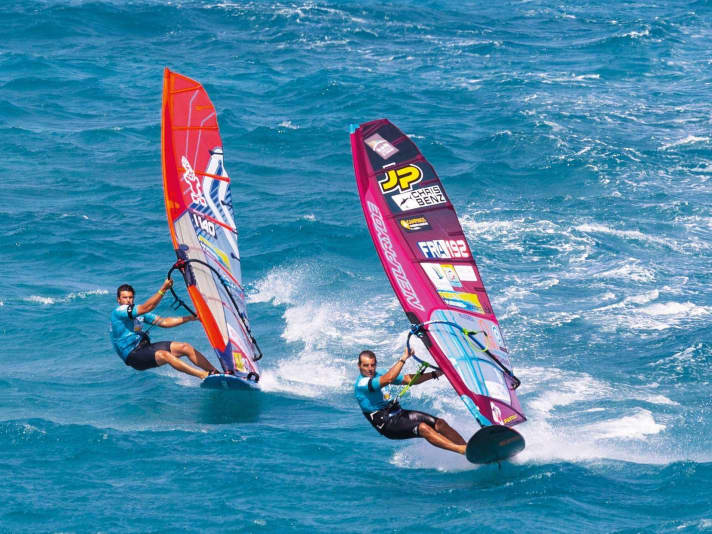
A house full of trophies
They are everywhere! I have some in my old house and some in my new house, there are also a few in my garage. You should see my dad's house. I have so many different trophies from events and the PWA trophies for the titles.
The new generation
I wasn't surprised that Maciek won the title. I saw him in 2020 when I travelled to Tenerife for training. I saw that a new generation was on the rise. The guys in it aren't completely new to the tour, but they've improved a lot through hard work. Guys like Maciek and Enrico Marotti. They're not that old yet, but they're the new contenders for the title. They've been riding for a while, very fast and keen to win. But because of Covid, they couldn't prove to the world how much they had improved. There were no events where they could have shown their level. I think there were two events, but if you don't do well at one, you're done for the year.
I actually thought Bruno Martini would be in the top three again this year. But it was Maciek who somehow managed it. He almost won on Sylt and he also surfed very well in Japan. I was happy that he won because he deserved it. He's worked very hard over the last three years. I've seen that - and I think if you work hard, you deserve it. I didn't think Matteo would be as fast as he was in Tenerife when I saw him in training. But he is an exceptional racer and has managed to catch up with Maciek. When I heard that they were equal on points, I didn't know who I wanted to see win.
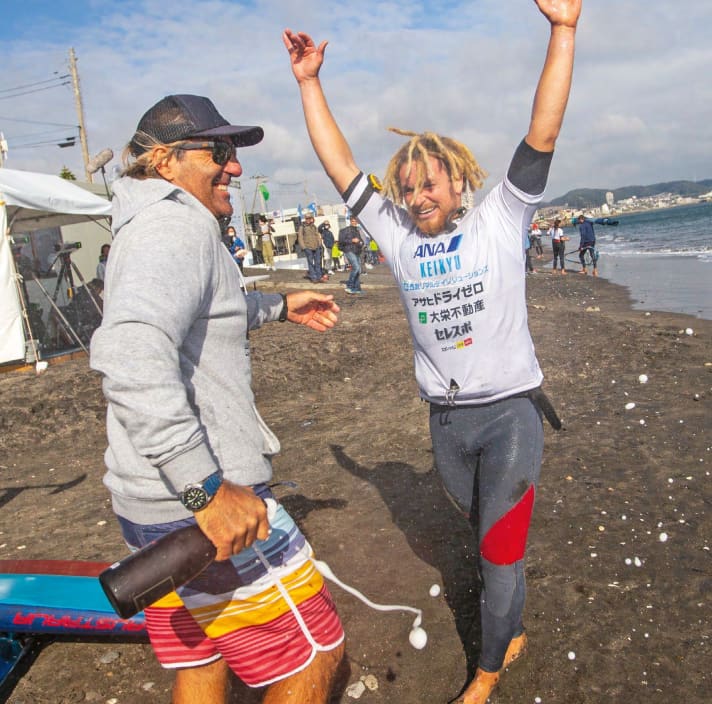
I have done without many things
To become world champion, you have to make a lot of sacrifices and dedicate your whole life to the sport. When I started competing, I lost all my friends at home. I was still in contact, but I didn't have time to keep in touch. I lost all my school friends in the first few years. You lose these relationships when you're travelling so much. I didn't have time, and there were no mobile phones or internet back then. It's a bit easier now. There were three or four years when I didn't speak to my best friend. Back then, I was travelling all year round. I was hardly ever at home. It was like that for about 15 years. I was lucky that my parents helped me a lot with all the paperwork and organising things at home. Thanks to my mum, at least I didn't have to think about these things.
Unforgettable moments for Antoine Albeau
There have been so many great moments in the last thirty years. But I also missed a few victories when I was fighting Björn. There were some events where I won the title in the last race of the season, like in Noumea against Cyril Moussilmani. I also had a race like that against Matteo. One year I won the title in Fuerteventura, but there were still two events to come in Turkey and Sylt. I had already won anyway, I almost won two more titles. In the last race, I lost to Wojtek Brosowski from Poland in Brazil in the Formula Windsurfing, which cost me the title by 0.7 points. I also missed out on a title by 0.3 points against Kevin Pritchard in the last race on Sylt. These leads were less than nothing. I still have 25 titles. One year I even came fifth at the Aloha Classic in the Hookipa wave on Maui, where I beat Dave Kalama and Josh Stone. And finally, I also won a title in the Super X discipline.
I don't feel like I'm retiring from windsurfing, I'm just starting a new chapter in my career. I feel in good shape and I know I can still race and reach fast speeds. I want to be on the water - and I want to be damn fast.
